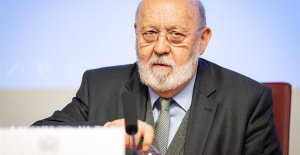They point to a technical loophole that would allow it to be done while waiting for what the TC sets
MADRID, 11 Ene. (EUROPA PRESS) -
The agreement between Junts and the PSOE to delegate powers in immigration matters to Catalonia has raised doubts about its constitutionality, since the Magna Carta expressly says that it is a matter exclusive to the State, although the experts consulted by Europa Press point out to a technical loophole that could make it possible while waiting for what the Constitutional Court (TC) determined at the time.
The pact, which made it possible to save two key decree-laws for the Government, contemplates "the delegation of powers over immigration to the Generalitat through article 150.2 of the Spanish Constitution, through a specific organic law for Catalonia", as well as as the "necessary resources", all with the objective that the autonomous community can "make a comprehensive policy."
Experts point to Article 149 of the Constitution as a starting point, which states the matters over which the State has exclusive jurisdiction, including "nationality, immigration, emigration, foreigners and the right to asylum."
However, they point to a second precept, the same one claimed by Junts, 150.2, according to which "the State may transfer or delegate to the autonomous communities, through organic law, powers corresponding to matters of state ownership that by their very nature are susceptible to transfer or delegation".
"Therefore, the State can take away powers through 150.2," explains José María Porras, professor of Constitutional Law at the University of Granada and Jean Monet chair on migration.
David Ortega, professor of Constitutional Law at the Rey Juan Carlos University, adds that the key is the requirement established by that same precept by saying that the State may give up its exclusive powers whenever the "nature" of the matters allows it.
In statements to Europa Press, Ortega states that it is an "indeterminate legal concept" whose lack of definition opens the door to practically any exclusive competence being delegated, with the Constitutional Court (TC) being the only one that can determine which ones and in what conditions. what measure.
Other legal sources agree that, although a literal reading of the Constitution leads one to think that immigration powers cannot be delegated, 150.2 offers a technical loophole to do so.
In fact, they emphasize that over the years the system of exclusive powers outlined in the Constitution "has become quite flexible" to the point that it has become "a debate that is more material than formal."
For the aforementioned sources, the 'crux' is where the red line is drawn. "If powers are delegated in an exclusive matter in such a way that its state character is emptied of its content, then it would be unconstitutional," they illustrate.
However, it is not a peaceful interpretation. Thus, Isabel Álvarez, professor of Constitutional Law at Comillas ICADE, has no doubt that immigration powers cannot be delegated to the autonomous communities.
Álvarez emphasizes that "care must be taken" because, although the 150.2 route has been used frequently, "it is designed to delegate powers that are owned by the state but that are acceptable to the autonomous communities."
The "assumable" ones, he specifies, are those reflected in Article 149 itself. And this is because in some, although it grants them the character of exclusive jurisdiction of the State, it adds a tagline that allows such transfer.
Thus, for example, in 149.1.7 it establishes that labor legislation is a state competence, "without prejudice to its execution by the bodies of the autonomous communities."
For the university professor, it is clear that immigration powers cannot be delegated because in her case (149.1.2) the Constitution does not contemplate any exceptions.
Javier Tajadura, professor of Constitutional Law at the University of the Basque Country, also sees it as "clearly unconstitutional" to cede immigration powers to Catalonia. But for different reasons. He understands that the "nature" of the matter does not allow it because it affects "the very unity of the State."
Porras, on the other hand, believes that it is possible to "attribute its management, not its ownership", because precisely immigration "is a transversal matter that affects many issues - labor, health, social - which are things that the autonomous communities provide. ".
The professor at the University of Granada details that the hard core of the state's jurisdiction in immigration refers to the legal status of the migrant, that is, entry, visa and expulsion. In his opinion, the rest is susceptible to transfer because "the daily management of the migrant is done by the autonomous communities."
However, the majority of experts consulted agree that it will be the TC that must resolve, where appropriate, the game between 149 and 150.2, clarifying whether immigration powers can be delegated and to what degree.

 Exploring Cardano: Inner Workings and Advantages of this Cryptocurrency
Exploring Cardano: Inner Workings and Advantages of this Cryptocurrency Seville.- Economy.- Innova.- STSA inaugurates its new painting and sealing hangar in San Pablo, for 18 million
Seville.- Economy.- Innova.- STSA inaugurates its new painting and sealing hangar in San Pablo, for 18 million Innova.- More than 300 volunteers join the Andalucía Compromiso Digital network in one month to facilitate access to ICT
Innova.- More than 300 volunteers join the Andalucía Compromiso Digital network in one month to facilitate access to ICT Innova.-AMP.- Ayesa acquires 51% of Sadiel, which will create new technological engineering products and expand markets
Innova.-AMP.- Ayesa acquires 51% of Sadiel, which will create new technological engineering products and expand markets Marc Márquez returns to pole in Jerez
Marc Márquez returns to pole in Jerez The CIS carries out a quick survey on Sánchez's letter to measure the reaction of citizens
The CIS carries out a quick survey on Sánchez's letter to measure the reaction of citizens 12M.- Puigdemont to Sánchez and Illa: "This is not about the future of the PSOE! What have you believed?"
12M.- Puigdemont to Sánchez and Illa: "This is not about the future of the PSOE! What have you believed?" Díaz proclaims that "the Government is not going to bow down" and asks not to be "on the defensive and locked in" against the right
Díaz proclaims that "the Government is not going to bow down" and asks not to be "on the defensive and locked in" against the right How Blockchain in being used to shape the future
How Blockchain in being used to shape the future Not just BTC and ETH: Here Are Some More Interesting Coins Worth Focusing on
Not just BTC and ETH: Here Are Some More Interesting Coins Worth Focusing on UPV students build a prototype of a wooden house to move to Equatorial Guinea
UPV students build a prototype of a wooden house to move to Equatorial Guinea The UA opens the call for the Impulso 2024 Awards for the best innovative business initiatives
The UA opens the call for the Impulso 2024 Awards for the best innovative business initiatives ALI, virtual assistant from Alicante, internationally recognized by the OECD
ALI, virtual assistant from Alicante, internationally recognized by the OECD Retrópolis brings the golden age of video games and computing to the UPV
Retrópolis brings the golden age of video games and computing to the UPV A million people demonstrate in France against Macron's pension reform
A million people demonstrate in France against Macron's pension reform Russia launches several missiles against "critical infrastructure" in the city of Zaporizhia
Russia launches several missiles against "critical infrastructure" in the city of Zaporizhia A "procession" remembers the dead of the Calabria shipwreck as bodies continue to wash up on the shore
A "procession" remembers the dead of the Calabria shipwreck as bodies continue to wash up on the shore Prison sentences handed down for three prominent Hong Kong pro-democracy activists
Prison sentences handed down for three prominent Hong Kong pro-democracy activists ETH continues to leave trading platforms, Ethereum balance on exchanges lowest in 3 years
ETH continues to leave trading platforms, Ethereum balance on exchanges lowest in 3 years Investors invest $450 million in Consensys, Ethereum incubator now valued at $7 billion
Investors invest $450 million in Consensys, Ethereum incubator now valued at $7 billion Alchemy Integrates Ethereum L2 Product Starknet to Enhance Web3 Scalability at a Price 100x Lower Than L1 Fees
Alchemy Integrates Ethereum L2 Product Starknet to Enhance Web3 Scalability at a Price 100x Lower Than L1 Fees Mining Report: Bitcoin's Electricity Consumption Declines by 25% in Q1 2022
Mining Report: Bitcoin's Electricity Consumption Declines by 25% in Q1 2022 Oil-to-Bitcoin Mining Firm Crusoe Energy Systems Raised $505 Million
Oil-to-Bitcoin Mining Firm Crusoe Energy Systems Raised $505 Million Microbt reveals the latest Bitcoin mining rigs -- Machines produce up to 126 TH/s with custom 5nm chip design
Microbt reveals the latest Bitcoin mining rigs -- Machines produce up to 126 TH/s with custom 5nm chip design Bitcoin's Mining Difficulty Hits a Lifetime High, With More Than 90% of BTC Supply Issued
Bitcoin's Mining Difficulty Hits a Lifetime High, With More Than 90% of BTC Supply Issued The Biggest Movers are Near, EOS, and RUNE during Friday's Selloff
The Biggest Movers are Near, EOS, and RUNE during Friday's Selloff Global Markets Spooked by a Hawkish Fed and Covid, Stocks and Crypto Gain After Musk Buys Twitter
Global Markets Spooked by a Hawkish Fed and Covid, Stocks and Crypto Gain After Musk Buys Twitter Bitso to offset carbon emissions from the Trading Platform's ERC20, ETH, and BTC Transactions
Bitso to offset carbon emissions from the Trading Platform's ERC20, ETH, and BTC Transactions Draftkings Announces 2022 College Hoops NFT Selection for March Madness
Draftkings Announces 2022 College Hoops NFT Selection for March Madness























